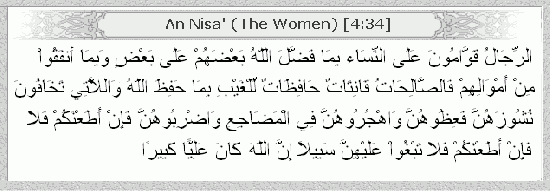Wife Beating in the Qur'an
This article or section is being renovated. Lead = 1 / 4
Structure = 1 / 4
Content = 1 / 4
Language = 1 / 4
References = 1 / 4
|
The Qur'an's fourth chapter, An-Nisaa' النساء, deals with a number of issues relating to men and women, and the relationship between husband and wife. Amongst these issues is the issue of when it is permissible for a husband to physically strike or beat his wife. One verse in particular, 4:34, lays out a three-scheme for how husbands, fearing nushuuz نشوز or disobediance from their wives, are to deal with them. In summary the steps are to first admonish her, then banish her to a different bed, and finally to beat her. The admonition is layed out in a matter-of-fact, very practical way, and it can thus be assumed that the Qur'an's audience was not highly disturbed nor surpised by this holy injunction for domestic violence. Over the centuries the mufassirun have taken up this verse and different scholars from different schools have come to different conclusions on the meaning of the verse vis-a-vis the three-step formula and what the meaning is exactly of nushuuz. All of the traditional scholars agree, however, that one way or another beating is an option that is available to the man. Modern progressive Muslims, under the influence of modern secular liberalism and its firm conviction that wife beating is never acceptable, have however rejected this tradition. Rather, they have sought a number of strategies to come to the conclusion that the Qur'an, and Islam as a whole, does not allow wife beating. These strategies include appeals to the hadith, appeals to peculariar juristic decisions, and linguistic reinterpretation of the verse, going so far as to lie about the meaning of the word "daraba" in this verse.
Introduction
The Qur'an takes up the issue of wife beating in two seperate passages. The first is [[Quran 4:34| surat-an-nisaa' ayah/verse 34]]:
Yusuf Ali translation: Men are the protectors and maintainers of women, because Allah has given the one more (strength) than the other, and because they support them from their means. Therefore the righteous women are devoutly obedient, and guard in (the husband's) absence what Allah would have them guard. As to those women on whose part ye fear disloyalty and ill-conduct, admonish them (first), (Next), refuse to share their beds, (And last) beat them (lightly); but if they return to obedience, seek not against them Means (of annoyance): For Allah is Most High, great (above you all).
Pickthall translation: Men are in charge of women, because Allah hath made the one of them to excel the other, and because they spend of their property (for the support of women). So good women are the obedient, guarding in secret that which Allah hath guarded. As for those from whom ye fear rebellion, admonish them and banish them to beds apart, and scourge them. Then if they obey you, seek not a way against them. Lo! Allah is ever High, Exalted, Great.
Shakir translation: Men are the maintainers of women because Allah has made some of them to excel others and because they spend out of their property; the good women are therefore obedient, guarding the unseen as Allah has guarded; and (as to) those on whose part you fear desertion, admonish them, and leave them alone in the sleeping-places and beat them; then if they obey you, do not seek a way against them; surely Allah is High, Great.
All of the agreed upon, relied upon Muslim translations of this verse into English agree that this verse instructs men on when and under what circumstances they are commanded to beat their wives. The verses sets out a three-part program for men dealing with "nushuuz" or disloyalty/disobediance. The three steps are to
Linguistic Analysis of Verse in Arabic
Asbab An-Nuzuul of the Verse
Tafsirs of the Verse
Modern Tafsirs
Abul A'la Al-Maududi (1903-1979)
Classical Tafsirs
Evidence from the Hadith
Modern Views and Perspectives on the Meaning of Qur'an 4:34
See Also
External Links
- Marriage to Minors: Surah At-Talaq (65:4) - Answering Islam
